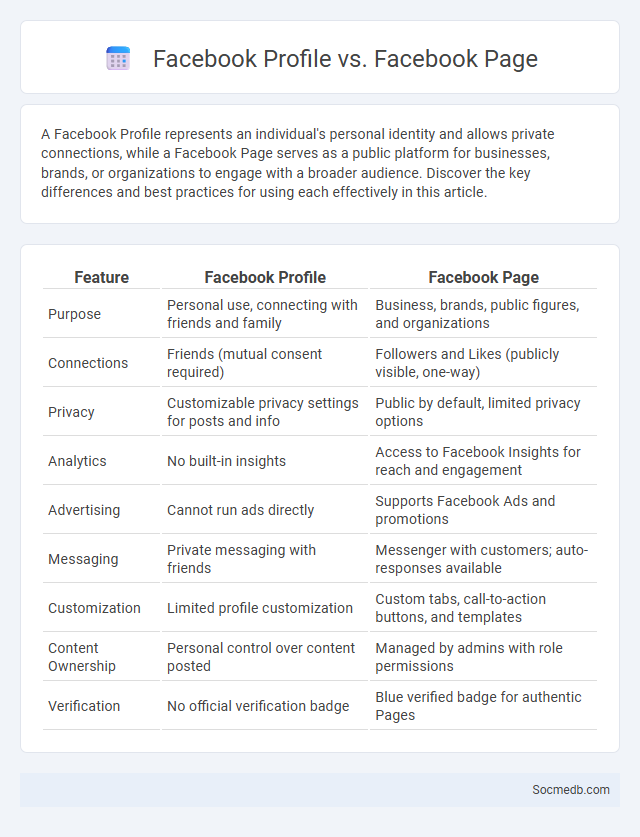
Photo illustration: Facebook Profile vs Facebook Page
A Facebook Profile represents an individual's personal identity and allows private connections, while a Facebook Page serves as a public platform for businesses, brands, or organizations to engage with a broader audience. Discover the key differences and best practices for using each effectively in this article.
Table of Comparison
| Feature | Facebook Profile | Facebook Page |
|---|---|---|
| Purpose | Personal use, connecting with friends and family | Business, brands, public figures, and organizations |
| Connections | Friends (mutual consent required) | Followers and Likes (publicly visible, one-way) |
| Privacy | Customizable privacy settings for posts and info | Public by default, limited privacy options |
| Analytics | No built-in insights | Access to Facebook Insights for reach and engagement |
| Advertising | Cannot run ads directly | Supports Facebook Ads and promotions |
| Messaging | Private messaging with friends | Messenger with customers; auto-responses available |
| Customization | Limited profile customization | Custom tabs, call-to-action buttons, and templates |
| Content Ownership | Personal control over content posted | Managed by admins with role permissions |
| Verification | No official verification badge | Blue verified badge for authentic Pages |
Introduction to Facebook: Profiles and Pages
Facebook offers two primary entities for engagement: Profiles and Pages, each serving distinct purposes. Your Profile represents your personal identity, enabling connections with friends and sharing updates, while Pages act as public profiles designed for businesses, brands, and organizations to reach and interact with a broader audience. Understanding the differences between Profiles and Pages is essential to leveraging Facebook's features effectively for personal networking or professional marketing strategies.
What is a Facebook Profile?
A Facebook Profile represents your personal identity on the social media platform, showcasing your photos, posts, and basic information like your birthday and location. It allows you to connect with friends, join groups, and share updates with your network. Your profile is the foundation of your online presence, enabling you to control how you interact with others and what content you share.
Features and Limitations of Facebook Profiles
Facebook profiles offer customizable timelines, extensive photo and video sharing options, and integrated messaging features that facilitate personal and professional connections. Privacy settings allow users to control the visibility of posts, friend lists, and personal information, enhancing security and user control. However, limitations include data privacy concerns, algorithm-driven content exposure that may create echo chambers, and restrictions on profile personalization beyond basic templates.
What is a Facebook Page?
A Facebook Page is a public profile designed specifically for businesses, brands, organizations, and public figures to connect with their audience on the platform. Your Facebook Page allows you to share updates, promote events, and engage with followers through posts, photos, videos, and messaging tools. It serves as a vital marketing tool to enhance your online presence and build community engagement effectively.
Unique Advantages of Facebook Pages
Facebook Pages offer businesses tailored tools for targeted audience engagement, including advanced analytics and customizable call-to-action buttons that enhance user interaction. The platform supports robust content formats like videos, live streams, and event promotions, enabling dynamic brand storytelling and community building. Integration with Facebook Ads allows precise demographic targeting, significantly improving marketing ROI and customer reach.
Facebook Profile vs Facebook Page: Key Differences
A Facebook Profile represents an individual's personal identity, allowing You to connect with friends, share updates, and manage privacy on a personal level. A Facebook Page is designed for businesses, brands, or public figures, enabling you to reach a wider audience with analytics, advertising tools, and content management suited for marketing. Understanding the key differences between a Profile and a Page helps optimize your social media strategy for personal interaction or business growth.
When to Use a Facebook Profile
A Facebook profile is best used when you want to build personal connections and share everyday moments with friends and family. You can showcase your personality, interests, and life updates while engaging in conversations that foster closer relationships. For professional networking or brand promotion, a Facebook Page or Group offers more tailored tools and analytics.
When to Use a Facebook Page
A Facebook Page is ideal for businesses, brands, public figures, and organizations seeking to establish a professional presence and engage with customers or fans on a large scale. Use a Facebook Page to share updates, promote events, run advertisements, and gain insights through Facebook Analytics. When the primary goal is broad outreach and brand building, a Facebook Page provides tools for community engagement and targeted marketing.
Common Mistakes: Profile vs Page
Confusing a social media profile with a page can limit brand growth and engagement opportunities; profiles are designed for individuals, while pages serve businesses and organizations with advanced analytics and advertising options. Users often make the mistake of using personal profiles for commercial purposes, risking account suspension and reduced professional credibility. Optimizing social media presence requires creating a dedicated page to leverage tools like targeted promotions, insights, and multiple admin roles.
Choosing the Best Option for Your Needs
Selecting the right social media platform depends on your specific goals, target audience, and content style, with key options including Facebook for broad reach, LinkedIn for professional networking, and Instagram for visual storytelling. Understanding the demographics and engagement patterns of each platform helps optimize your marketing strategy and maximize ROI. Tailoring content to fit the chosen platform's algorithm and user behavior ensures higher visibility and stronger audience connection.
 socmedb.com
socmedb.com